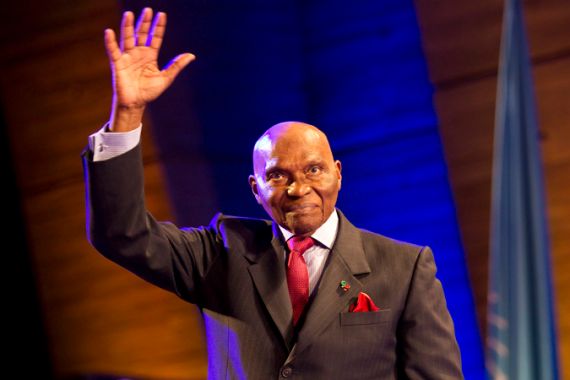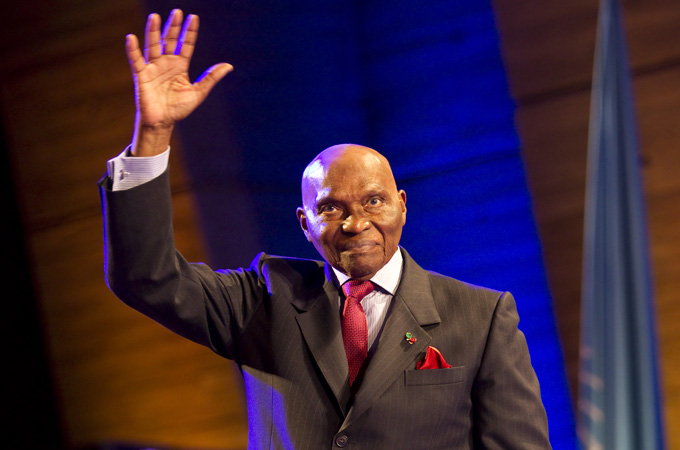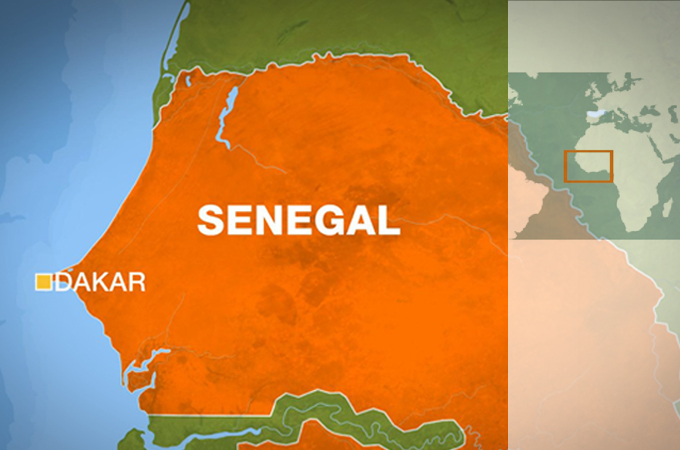Profile: Abdoulaye Wade
Once a symbol of democracy on the African continent, the mood soured towards Senegal’s ex-president during 2012 polls.

 |
| Wade had been criticised for wanting to remain in power despite a pledge in 2007 to step down in 2012 [EPA] |
Abdoulaye Wade, Senegal’s ex-president, ruled over the West African nation from 2000 until he was defeated by his former protege in the 2012 presidential poll.
Macky Sall, who once served as prime minister under Wade, beat the 85-year-old, achieving a landslide win in the February runoff elections.
Wade, nicknamed “Gorgui” (“Old Man” in the West African language Wolof), has tried to stamp his legacy on Africa, and has been a staunch supporter of the idea of a United States of Africa pushed by fallen Libyan leader Muammar Gaddafi.
He had competed in four elections over a period of 25 years before winning the presidential elections when he dislodged the Socialist Party from office after 40 years of uninterrupted rule.
His victory was met with hope in the West African state. The manner in which his defeated rival, Abdou Diouf bowed out, graciously accepting Wade’s victory, the former French colony was hailed as a model of democracy in Africa.
More than a decade later, however, the mood has soured towards Wade.
In 2012, he attempted to seek a third term in office on a constitutional technicality, angering critics who already aired discontent over the corruption, nepotism and financial scandals under his rule.
The country’s current constitution was adopted in 2001. It reduced terms to five years after the completion of Wade’s term at office. In 2008, however, the National Assembly approved a constitutional amdendment that increased his term to seven years.
Criticism
Recognised as a decisive leader who developed the nation’s infrastructure, Wade’s presidency was marred by a series of allegations of fraud, nepotism and limiting the freedom of the press.
In 2010, Wade unveiled a 50-metre bronze African Renaissance statue that cost $20mn. The artwork was poorly received by countrymen facing severe financial trouble.
Many were baffled at Wade’s decision to run for a third term, rather than leaving with a strong legacy of development and infrastructure-building.
A merchant’s son, born on May 29, 1926, Wade studied law in France where he met his wife Viviane. He also holds degrees in economics and applied mathematics.
In 1974, Wade convinced Senegal’s father of independence, the poet-cum-president Leopold Sedar Senghor, to let him create an opposition party, the Senegalese Democratic Party.
Under Diouf’s rule, Wade became known as the “president of the street” and was imprisoned several times. He was finally elected in 2000 for a seven-year term and in 2007 for a five-year term.
‘Dynastic succession’
 |
In standing for re-election, Wade had said he needed three more years to complete his projects, fueling speculation that he wanted to line up a successor.
He had long been accused of trying to position his 44-year-old son Karim Wade to take over from him.
A US diplomatic dispatch published by WikiLeaks in 2010 slammed corruption and warned that Senegal was “a weakening democracy”.
It alleged that Wade was looking to “open a path to a dynastic presidential succession”.
In June 2011, the usually peaceful nation was shaken by violent riots in the seaside capital Dakar when Wade tried to change the constitution. He scrapped these plans under pressure at home as well as abroad.
The United States had repeatedly urged Wade to drop his presidential bid, fearing a blow to the country’s democracy and further violence.
He wanted to reduce the proportion of votes needed to win a presidential election from more than 50 per cent to 25 per cent and also create an elected post of vice president.
This post was seen as designed for his son, whose appointment as a “super-minister” in 2009 drew widespread anger.